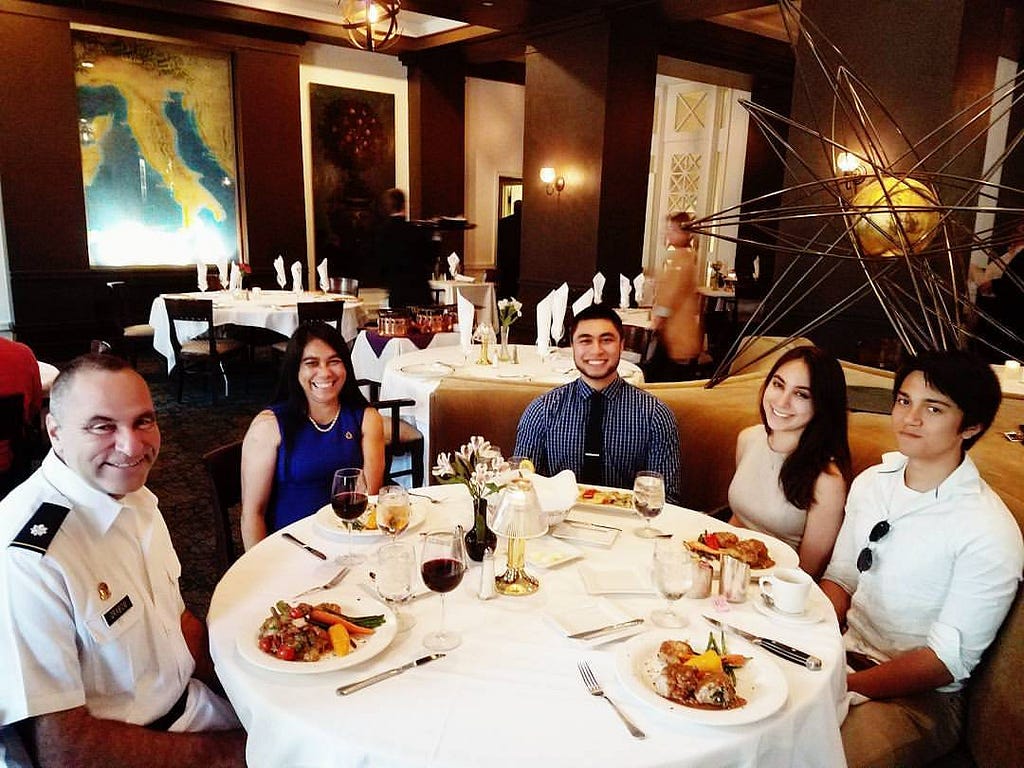Education Revolution: Hadida Grabow Of Higher Learning Group On Innovative Approaches That Are Transforming Education
An interview with Eden Gold
Most of the time, success is the result of hard work over time. It’s not just luck.
The landscape of education is undergoing a profound transformation, propelled by technological advancements, pedagogical innovations, and a deepened understanding of learning diversities. Traditional classrooms are evolving, and new modes of teaching and learning are emerging to better prepare students for the complexities of the modern world. This series will take a look at the groundbreaking work being done across the globe to redefine education. As a part of this interview series, we had the pleasure to interview Hadida Grabow.
Hadida Grabow is the founder of Higher Learning Group, as well as the Director of Operations for KWT English and its subsidiaries. She is an alumnus of the University of Wisconsin-Madison and is a graduate of Harvard Business School’s CORe program. She has over a decade of experience in the for-profit education sector and believes in the value of lifelong education.
Thank you so much for doing this with us! Our readers would love to “get to know you” a bit better. Can you share the “backstory” behind what brought you to this particular career path?
It’s a pleasure to speak with you! Like many of my colleagues in the education field, my initial foray into the industry was a “happy accident”. I signed up to tutor Asian businesspeople in English online when I was completing my undergraduate degree in Wisconsin, and here we are a decade later!
Can you share the most interesting story that happened to you since you started your career? Can you tell us what lesson you learned from that?
When I was first starting out as an educator, I had a young learner enroll in my class that was completely silent. They would isolate themselves in class and wouldn’t participate, and as a fresh teacher myself I wasn’t sure on how to engage with that student successfully. After some coaching from an administrator at the time, I learned that students like this- particularly children- are oftentimes shy or don’t understand the material. I had a discussion with the parent, and after they were allowed to bring their favorite toy with them to class, they started to speak up more in class and started making friends with other children. I’ve had a multitude of students like this over the years, and the lesson learned is that not every student will respond to the same class environment in the same way. It’s your job as the teacher not just to present the material, but to present it in such a way and create an environment where that material can be absorbed.
Can you briefly share with our readers why you are an authority in the education field?
I have been in the for-profit education sector for over a decade. Over the last ten years, I have had the honor of being an educator, administrator, and the founder of a private education company, and the experiences I’ve had in each role have given me a robust understanding of what students and educators want.
Can you identify some areas of the US education system that are going really great?
As a product of the US education system myself, I have had the honor of attending some of the best universities and working with some of the most talented individuals the world has to offer. The caliber of our higher education system is simply stunning; according to “US News”, 8 of the top 10 universities globally are in the United States, and according to the Institute of International Education, the United States has been the single most popular destination for international students in both 2022 and 2023. I can only hope that this global recognition and overall quality can continue in years to come.
Can you identify the key areas of the US education system that should be prioritized for improvement? Can you explain why those are so critical?
That’s not to say that there are not some areas where we could serve our students better. I think we all saw some of those weak spots become more apparent during the pandemic, particularly with our younger learners. Students with poorer access to the social support and technological resources needed to be successful in remote learning fell behind their more advantaged classmates, and with increasing class sizes caused by a shortage of teachers, we saw school faculty struggle to give their students the personalized attention they sorely needed both during and after the pandemic.
Please tell us all about the innovative educational approaches that you are using. What is the specific problem that you aim to solve, and how have you addressed it?
Our primary focus has always been on improving accessibility to education through quality, live online learning supplemented by artificial intelligence, or AI.
We’ve found that for our students, it is very difficult to gain any meaningful mastery of course content relying on self-guided study via an app or pre-recorded, recycled lectures. Live instruction has always been the gold standard of education. Being able to access their teachers online alleviates some of those barriers we see to learning and makes it more likely that our students will attend class regularly and be available to absorb that material in the first place.
A new area of interest for us is, of course, the use of AI to give our students and teachers personalized support. Our students can have what amounts to their own personal teaching assistant review their mistakes, monitor how they are doing on skills mastery compared to their peers, and issue personalized feedback to both the student and the teacher regarding what is needed to bring their mastery up to curriculum standards- and hopefully exceed them.
In what ways do you think your approach might shape the future of education? What evidence supports this?
We hope that our dual-headed approach will help make education more accessible. Particularly with the pandemic, we’ve seen an increased push for online offerings, and now with the pandemic over, we see a demand for that continued flexibility with an expectation of the same high quality curriculum and attention that we would normally exclusively see in a physical classroom.
How do you measure the impact of your innovative educational practices on students’ learning and well-being?
Our primary source of feedback on student performance is direct communication and standardized testing between an individual student and their teacher. A strong relationship between a student and their teacher has always been the touchstone of every high-quality educational program, and ours is no exception; we are not at a point where this can be replaced by a computer program or AI. With that said, AI does provide us more data oversight to alert our teachers when a student might be falling behind or need more coverage of a certain subject in order to be successful. This marriage of data-driven education with human oversight gives us a holistic idea of how our students are doing both on-paper and in practice.
What challenges have you faced in implementing your educational innovations, and how have you overcome them?
To continue my answer to the previous question, more data is not always better or more effective; sometimes an overabundance of data can distract our teachers from the big picture. Teachers have known for a while that students who test well on paper sometimes struggle applying that knowledge in the real world and vice versa, so a central goal of ours has been to give our teachers not just more data, but the right data to help their students. We worked closely with our teachers to identify which metrics truly matter, implemented them into our program, and then trained them to interpret and utilize this data in the classroom on a day-to-day basis.
Keeping in mind the “Law of Unintended Consequences” can you see any potential drawbacks of this innovation that people should think more deeply about?
A big one that we have already seen with generative AI models is the evangelization of and over-reliance on technology. Education is a very personal, very relational field that relies on a strong bond between a teacher and student, and removing too much of that human interaction can diminish the quality of education received by students.

What are your “5 Things I Wish I Knew When I First Started”?
1 . Expect the unexpected, both in the classroom and in business.
2 . Most of the time, success is the result of hard work over time. It’s not just luck.
3 . Find a good mentor (or two or three).
4 . Find balance, or balance will find you.
5 . Sometimes you just need a cup of tea.
Can you please give us your favorite “Life Lesson Quote”? Can you share how that was relevant to you in your life?
One of my favorites is the Latin phrase, “Fortis fortuna adiuvat,” or “Fortune favors the brave.” The world is a big place, and we only have one hundred years to experience it. At many points in my career, I have been nervous about taking a big step- or a misstep- but have never once regretted doing so after the fact. The best opportunities of my life have all come out of these moments of risk.
We are blessed that some of the biggest names in Business, VC funding, Sports, and Entertainment read this column. Is there a person in the world, or in the US, with whom you would love to have a private breakfast or lunch, and why? He or she might just see this if we tag them 🙂
This is a longshot, but Dr. Nancy Coleman, the current Dean of Harvard Extension School. I intend on pursuing my Master’s in Management there in the near future and would love to hear her thoughts on how online learning has benefitted Harvard University.
How can our readers further follow your work online?
I’m always happy to connect on LinkedIn!
Thank you so much for these insights! This was so inspiring!
About The Interviewer: Eden Gold, is a youth speaker, keynote speaker, founder of the online program Life After High School, and host of the Real Life Adulting Podcast. Being America’s rising force for positive change, Eden is a catalyst for change in shaping the future of education. With a lifelong mission of impacting the lives of 1 billion young adults, Eden serves as a practical guide, aiding young adults in honing their self-confidence, challenging societal conventions, and crafting a strategic roadmap towards the fulfilling lives they envision.
Do you need a dynamic speaker, or want to learn more about Eden’s programs? Click here: https://bit.ly/EdenGold
Education Revolution: Hadida Grabow Of Higher Learning Group On Innovative Approaches That Are… was originally published in Authority Magazine on Medium, where people are continuing the conversation by highlighting and responding to this story.


